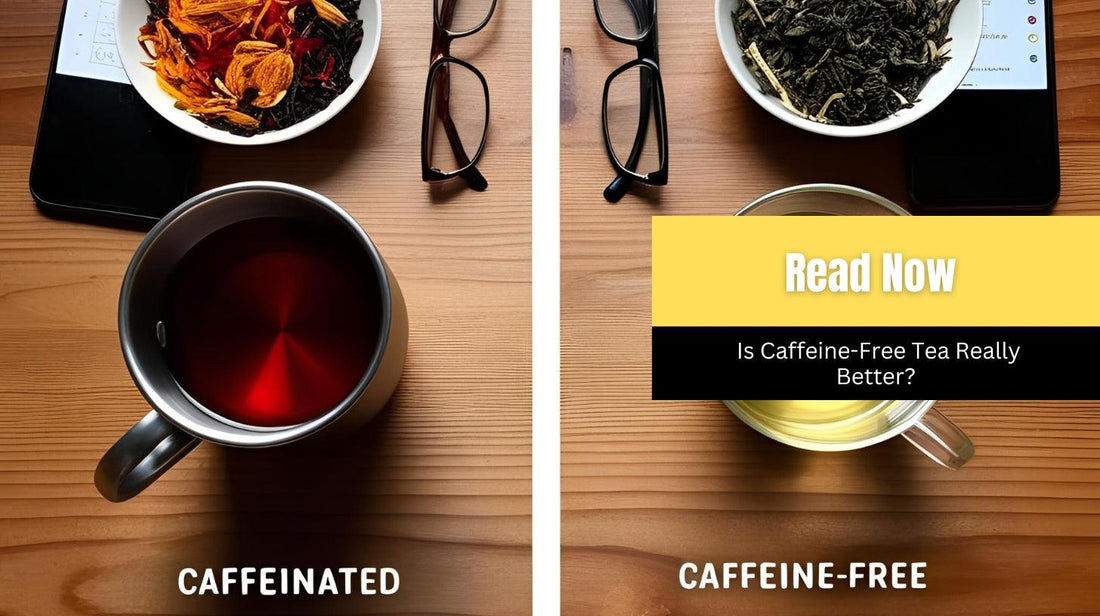
Is Caffeine-Free Tea Really Better? What You Need to Know
The Tea-Time Dilemma
Caffeine is like that energetic friend who’s always ready to party, even when you just want to chill. If you're a tea lover trying to balance your energy levels, sleep, or stress, you might be wondering: is caffeine-free tea the better choice?
The short answer? It depends on your body, your lifestyle, and your needs. Let’s dive into what caffeine-free tea really is, who should consider making the switch, and which brews offer maximum calm without the caffeine buzz.
What Is Caffeine-Free Tea, Exactly?
Let’s clarify first: caffeine-free tea and decaffeinated tea are not the same.
- Caffeine-free tea comes from herbs, flowers, or fruits that naturally contain zero caffeine—like chamomile, tulsi, or spearmint.
- Decaffeinated tea starts as a tea with caffeine (like black or green tea), and then the caffeine is chemically removed.
Caffeine-free herbal teas are naturally mellow and often brewed for their calming, digestive, or wellness-boosting properties.
3 Big Reasons People Choose Caffeine-Free Tea
-
Better Sleep
Caffeine is a stimulant, and even afternoon cups can interfere with a good night’s rest. If you're struggling to fall asleep or stay asleep, going caffeine-free—especially after lunch—can make a huge difference. -
Less Jitters, More Zen
If your morning tea leaves you feeling anxious or overstimulated, caffeine could be the culprit. Caffeine-free herbal teas like chamomile or spearmint are known for their calming effects, helping reduce stress instead of ramping it up. -
Gentler on the Gut
Some people experience acid reflux or stomach discomfort from caffeinated drinks. Herbal teas are often easier on the digestive system, with some blends (like tulsi or lemongrass) even helping with bloating or digestion.
So, Is Caffeine-Free Tea Better?
“Better” is subjective. For some, caffeine is a must-have focus tool. For others, it’s a sleep-sabotaging villain.
Caffeine-free tea might be better for you if:
- You’re sensitive to caffeine
- You have anxiety, insomnia, or high blood pressure
- You’re pregnant or nursing
-
You want to relax without crashing
Caffeinated tea might still be great if:
- You’re looking for a gentle energy boost
- You enjoy the flavor of black, green, or oolong teas
- You consume it in moderation and it doesn’t affect your sleep
Danfe’s Top Caffeine-Free Teas for Pure Calm
Looking to ease into a caffeine-free routine? Here are some of Danfe Tea’s best herbal blends, all naturally caffeine-free:
-
47° Tulsi Chamomile Tranquility Herbal Tea
Tulsi (holy basil) balances the body, while chamomile soothes the mind. Perfect for evenings. -
85° Spearmint Lemongrass Herbal Tea
Refreshing, citrusy, and great for digestion. A bright blend that’s ideal post-meal or mid-afternoon. -
62° Lemongrass Tea (Loose Leaf Herbal Tea)
With a zesty kick and digestive support benefits, this one’s a cozy caffeine-free champion. -
93° Himalayan Moringa Tea A nutrient-rich superfood tea that supports immunity and clarity—without a drop of caffeine.
Whether you're cutting back on caffeine for better sleep, calmer days, or digestive ease, Danfe Tea has a collection of herbal brews ready to help you relax—naturally. Explore our full range of caffeine-free teas and make your tea time truly tranquil.
Shop Caffeine-Free Teas at Danfe
When Is the Best Time to Drink Caffeine-Free Tea?
- Morning: Start slow with a light herbal blend like spearmint.
- Afternoon: Sip lemongrass or moringa to unwind without crashing.
- Evening: Unplug with tulsi chamomile for the ultimate wind-down ritual
FAQs
Q: Can caffeine-free tea help with anxiety?
A: Yes! Herbs like chamomile, tulsi, and spearmint are known for their calming effects and are popular for natural anxiety support.
Q: Is decaffeinated tea the same as caffeine-free?
A: Not quite. Decaffeinated teas once had caffeine that was removed, while caffeine-free teas never had any to begin with.
Q: Can I drink caffeine-free tea all day?
A: Absolutely. Herbal teas are gentle enough to sip all day—just be sure to choose blends that agree with your digestion.
Q: Are there side effects to switching to caffeine-free tea?
A: You may notice some caffeine withdrawal symptoms (like mild headaches) if you're cutting back suddenly, but herbal teas can ease that transition.










